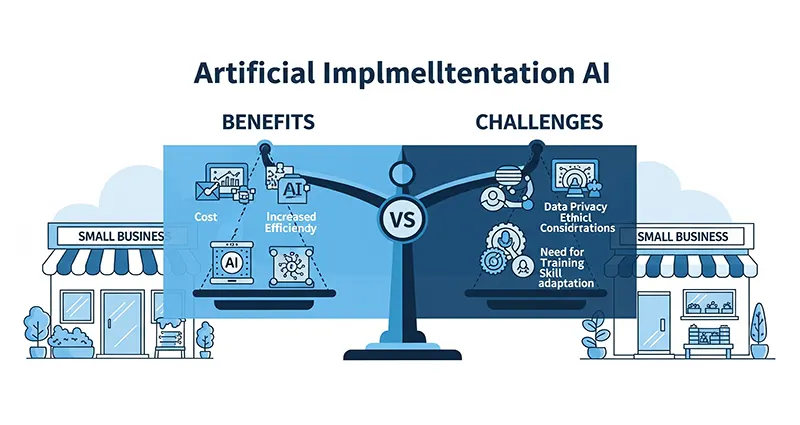Artificial Intelligence (AI) has emerged as a transformative technology that offers numerous benefits for businesses of all sizes, including small enterprises. While AI can streamline operations, improve efficiency, and drive growth, it also presents unique challenges that small businesses need to navigate. Let’s explore the benefits and challenges of implementing AI in small businesses.
Benefits of Implementing AI in Small Businesses:
1. Increased Efficiency:
AI-powered tools and systems can automate repetitive tasks, allowing small businesses to operate more efficiently and free up employees to focus on strategic initiatives.
2. Enhanced Decision-Making:
AI algorithms can analyze vast amounts of data quickly and provide valuable insights that can inform decision-making processes, helping small businesses make data-driven decisions.
3. Improved Customer Experience:
AI-powered chatbots and virtual assistants can provide round-the-clock customer support, personalize interactions, and enhance the overall customer experience for small businesses.
4. Cost Savings:
By automating tasks and improving operational efficiency, AI can help small businesses optimize resources, reduce operational costs, and boost profitability.
5. Competitive Advantage:
Small businesses that leverage AI technologies can gain a competitive edge by staying ahead of market trends, anticipating customer needs, and offering innovative products and services.
Challenges of Implementing AI in Small Businesses:
1. Cost of Implementation:
Acquiring and implementing AI technologies can be costly for small businesses, including investment in software, hardware, training, and maintenance, which may pose financial challenges.
2. Data Quality and Privacy Concerns:
Small businesses may struggle with data quality issues or privacy concerns when collecting and utilizing data for AI applications, requiring robust data management practices.
3. Skill Gaps and Training Needs:
Small businesses may lack the expertise and resources to effectively implement and manage AI technologies, necessitating training programs for employees to develop AI skills.
4. Integration Complexity:
Integrating AI systems with existing business processes and systems can be complex and time-consuming, requiring careful planning and coordination to ensure seamless integration.
5. Ethical and Regulatory Considerations:
Small businesses need to navigate ethical dilemmas and comply with regulations regarding AI implementations, such as data privacy laws and transparency in algorithmic decision-making.
Implementing AI in small businesses offers a range of benefits, from increased efficiency and enhanced decision-making to improved customer experience and cost savings. However, small businesses also face challenges such as high implementation costs, data quality issues, skill gaps, integration complexity, and ethical considerations when adopting AI technologies. By understanding these benefits and challenges, small businesses can strategically leverage AI to drive innovation, competitiveness, and growth in today’s digital economy.









